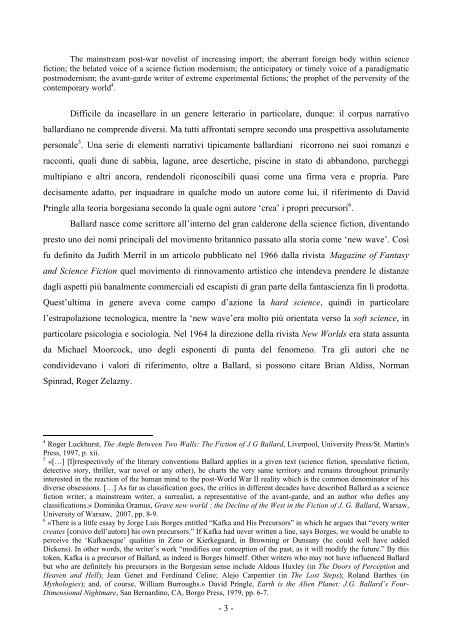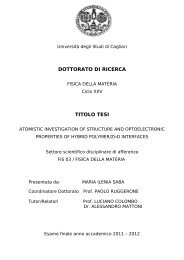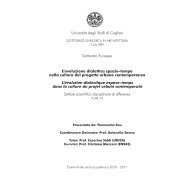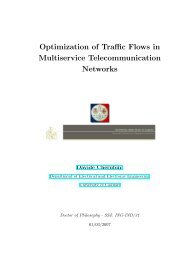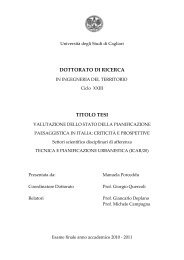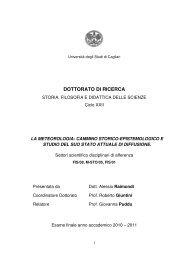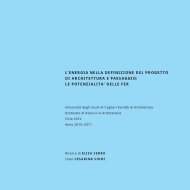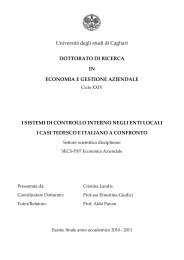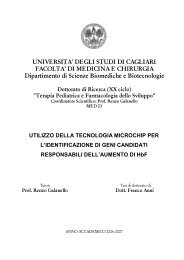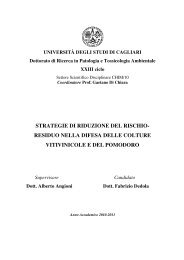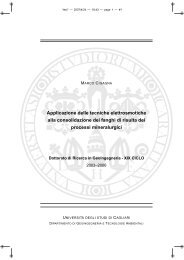The only truly alien planet is Earth. - UniCA Eprints - Università degli ...
The only truly alien planet is Earth. - UniCA Eprints - Università degli ...
The only truly alien planet is Earth. - UniCA Eprints - Università degli ...
You also want an ePaper? Increase the reach of your titles
YUMPU automatically turns print PDFs into web optimized ePapers that Google loves.
<strong>The</strong> mainstream post-war novel<strong>is</strong>t of increasing import; the aberrant foreign body within science<br />
fiction; the belated voice of a science fiction modern<strong>is</strong>m; the anticipatory or timely voice of a paradigmatic<br />
postmodern<strong>is</strong>m; the avant-garde writer of extreme experimental fictions; the prophet of the perversity of the<br />
contemporary world 4 .<br />
Difficile da incasellare in un genere letterario in particolare, dunque: il corpus narrativo<br />
ballardiano ne comprende diversi. Ma tutti affrontati sempre secondo una prospettiva assolutamente<br />
personale 5 . Una serie di elementi narrativi tipicamente ballardiani ricorrono nei suoi romanzi e<br />
racconti, quali dune di sabbia, lagune, aree desertiche, p<strong>is</strong>cine in stato di abbandono, parcheggi<br />
multipiano e altri ancora, rendendoli riconoscibili quasi come una firma vera e propria. Pare<br />
dec<strong>is</strong>amente adatto, per inquadrare in qualche modo un autore come lui, il riferimento di David<br />
Pringle alla teoria borgesiana secondo la quale ogni autore ‘crea’ i propri precursori 6 .<br />
Ballard nasce come scrittore all’interno del gran calderone della science fiction, diventando<br />
presto uno dei nomi principali del movimento britannico passato alla storia come ‘new wave’. Così<br />
fu definito da Judith Merril in un articolo pubblicato nel 1966 dalla riv<strong>is</strong>ta Magazine of Fantasy<br />
and Science Fiction quel movimento di rinnovamento art<strong>is</strong>tico che intendeva prendere le d<strong>is</strong>tanze<br />
dagli aspetti più banalmente commerciali ed escap<strong>is</strong>ti di gran parte della fantascienza fin lì prodotta.<br />
Quest’ultima in genere aveva come campo d’azione la hard science, quindi in particolare<br />
l’estrapolazione tecnologica, mentre la ‘new wave’era molto più orientata verso la soft science, in<br />
particolare psicologia e sociologia. Nel 1964 la direzione della riv<strong>is</strong>ta New Worlds era stata assunta<br />
da Michael Moorcock, uno <strong>degli</strong> esponenti di punta del fenomeno. Tra gli autori che ne<br />
condividevano i valori di riferimento, oltre a Ballard, si possono citare Brian Ald<strong>is</strong>s, Norman<br />
Spinrad, Roger Zelazny.<br />
4<br />
Roger Luckhurst, <strong>The</strong> Angle Between Two Walls: <strong>The</strong> Fiction of J G Ballard, Liverpool, University Press/St. Martin's<br />
Press, 1997, p. xii.<br />
5<br />
«[…] [I]rrespectively of the literary conventions Ballard applies in a given text (science fiction, speculative fiction,<br />
detective story, thriller, war novel or any other), he charts the very same territory and remains throughout primarily<br />
interested in the reaction of the human mind to the post-World War II reality which <strong>is</strong> the common denominator of h<strong>is</strong><br />
diverse obsessions. […] As far as classification goes, the critics in different decades have described Ballard as a science<br />
fiction writer, a mainstream writer, a surreal<strong>is</strong>t, a representative of the avant-garde, and an author who defies any<br />
classifications.» Dominika Oramus, Grave new world : the Decline of the West in the Fiction of J. G. Ballard, Warsaw,<br />
University of Warsaw, 2007, pp. 8-9.<br />
6<br />
«<strong>The</strong>re <strong>is</strong> a little essay by Jorge Lu<strong>is</strong> Borges entitled “Kafka and H<strong>is</strong> Precursors” in which he argues that “every writer<br />
creates [corsivo dell’autore] h<strong>is</strong> own precursors.” If Kafka had never written a line, says Borges, we would be unable to<br />
perceive the ‘Kafkaesque’ qualities in Zeno or Kierkegaard, in Browning or Dunsany (he could well have added<br />
Dickens). In other words, the writer’s work “modifies our conception of the past, as it will modify the future.” By th<strong>is</strong><br />
token, Kafka <strong>is</strong> a precursor of Ballard, as indeed <strong>is</strong> Borges himself. Other writers who may not have influenced Ballard<br />
but who are definitely h<strong>is</strong> precursors in the Borgesian sense include Aldous Huxley (in <strong>The</strong> Doors of Perception and<br />
Heaven and Hell); Jean Genet and Ferdinand Celine; Alejo Carpentier (in <strong>The</strong> Lost Steps); Roland Barthes (in<br />
Mythologies); and, of course, William Burroughs.» David Pringle, <strong>Earth</strong> <strong>is</strong> the Alien Planet: J.G. Ballard’s Four-<br />
Dimensional Nightmare, San Bernardino, CA, Borgo Press, 1979, pp. 6-7.<br />
- 3 -


